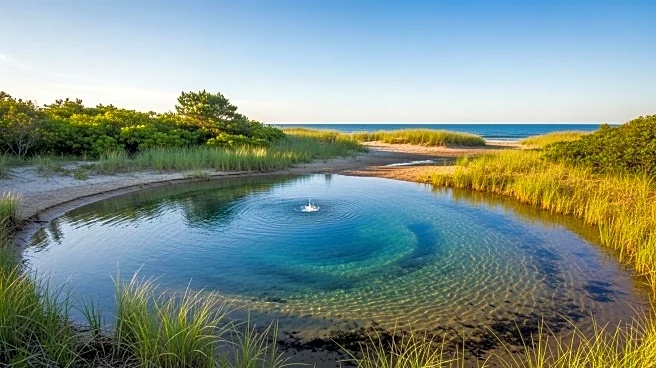What is the story about?
What's Happening?
A recent scientific expedition has uncovered a significant freshwater aquifer beneath the seafloor off Cape Cod, stretching from New Jersey to Maine. This discovery was made by Expedition 501, a global research initiative backed by the U.S. National Science Foundation and the European Consortium for Ocean Research Drilling. The aquifer, found in shallow salt waters, could potentially provide a substantial source of fresh water to meet increasing global demand. The expedition extracted thousands of samples, revealing fresh or nearly fresh water at various depths, suggesting a larger supply than initially anticipated. The research aims to understand the origins of this water, whether from glaciers or connected groundwater systems, and assess its feasibility for public use.
Why It's Important?
The discovery of this hidden aquifer is significant as it could help address the looming global water shortage predicted by the United Nations, which estimates that demand for fresh water will exceed supply by 40% within five years. Rising sea levels and the increasing water consumption by data centers exacerbate the scarcity of freshwater resources. If feasible, tapping into this aquifer could provide a sustainable solution for regions facing severe drought conditions. However, challenges remain in extracting the water without harming the environment and determining ownership and usage rights. The potential impact on local ecosystems and the balance of terrestrial and marine water sources must be carefully considered.
What's Next?
The next steps involve extensive analysis of the water samples to determine their age, origin, and safety for consumption. Researchers will investigate the microbial ecology and mineral content to assess the water's quality. The findings will help determine whether the aquifer is a renewable resource and how it can be responsibly utilized. The expedition's results will be shared in a collaborative research session in Germany, aiming to produce initial findings on the water's age and origin. Policymakers and conservationists will need to address complex questions regarding management, environmental impact, and the feasibility of using this resource.
Beyond the Headlines
The discovery raises ethical and environmental concerns about exploiting undersea freshwater resources. Tapping into these aquifers could disrupt marine ecosystems and affect terrestrial water reserves. The balance between meeting human needs and preserving natural habitats must be carefully managed. Additionally, the geopolitical implications of accessing shared water resources could lead to international disputes over ownership and usage rights. The long-term sustainability of using undersea aquifers as a freshwater source remains uncertain, requiring further research and policy development.
















